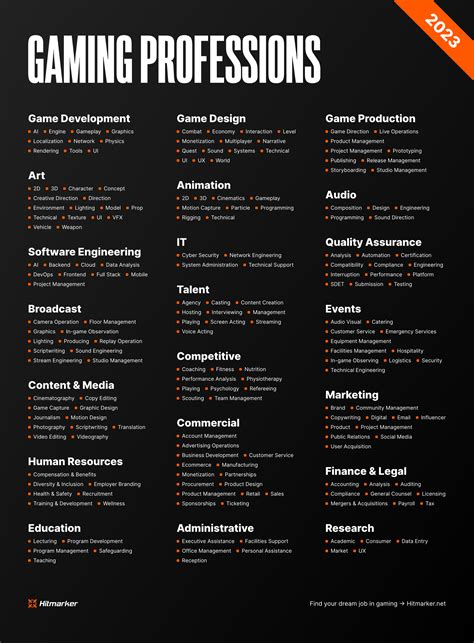The video game industry is booming, with global revenues expected to reach $268.81 billion by 2025, according to Statista. This growth is fueling the demand for skilled professionals in various fields related to game development, design, and marketing. Explore the myriad career opportunities available in this dynamic and thriving industry.

Types of Jobs in the Video Game Industry
1. Game Developers
- Software Engineers: Design, code, and test game engines, game mechanics, and gameplay elements.
- Artists: Create 2D and 3D models, textures, animations, and visual effects.
- Designers: Conceptualize and design game worlds, characters, storylines, and gameplay experiences.
- Producers: Manage the development process, set budgets, and ensure on-time delivery.
2. Game Designers
- Level Designers: Create and layout game environments, obstacles, and puzzles.
- Narrative Designers: Craft compelling storylines, dialogue, and character arcs.
- Game Mechanics Designers: Develop and balance gameplay mechanics, rules, and systems.
3. Game Testers
- Manual Testers: Play games thoroughly to identify and report bugs and glitches.
- Automated Testers: Write scripts and use tools to automate testing processes.
- Usability Testers: Evaluate game usability, accessibility, and user experience.
4. Game Marketers
- Product Managers: Analyze market trends, develop marketing strategies, and manage game launches.
- PR Specialists: Handle public relations, media outreach, and community engagement.
- Social Media Managers: Engage with players on social media platforms, promote games, and build communities.
Skills and Qualifications
Depending on the specific role, employers typically seek professionals with the following skills:
- Strong technical knowledge: Programming languages, game engines, and design tools.
- Artistic talent: Drawing, modeling, animation, and visual design skills.
- Creative thinking: Ability to generate innovative ideas and craft immersive experiences.
- Attention to detail: Meticulousness in identifying and resolving issues.
- Teamwork and communication skills: Collaborating effectively within multidisciplinary teams.
Education and Training
While a formal education is not always required, many employers prefer candidates with:
- Bachelor’s or Master’s degree in Computer Science, Game Design, or a related field.
- Certification in game development, design, or testing.
- Portfolio showcasing relevant skills and experience.
Career Path and Outlook
Jobs in the video game industry offer exciting career paths with potential for specialization and advancement.
- Junior roles typically involve assisting with tasks under the guidance of senior professionals.
- With experience and skills development, individuals can move into lead or managerial positions.
- Specializing in a particular area (e.g., game design, programming, testing) can provide opportunities for career growth and financial rewards.
Job Outlook: The U.S. Bureau of Labor Statistics projects a 13% job growth for software developers, including those in the video game industry, from 2021 to 2031.
Benefits of Working in the Video Game Industry
- Passion for games: Work on projects you are enthusiastic about and contribute to creating entertainment for millions.
- Creativity and innovation: Engage in a field where you can express your artistic and technical abilities.
- High earning potential: Skilled professionals in the industry command competitive salaries and benefits.
- Job security: The growing demand for games ensures job stability and opportunities for career advancement.
- Collaborative environment: Collaborate with talented and passionate individuals to produce exceptional gaming experiences.
Challenges and Considerations
- Competition: The video game industry can be highly competitive, especially in obtaining entry-level positions.
- Tight deadlines: Game development projects often operate on strict schedules, requiring flexibility and adaptability.
- Long hours: Crunch time is common in the industry, particularly during development milestones.
- Burnout: The demanding nature of the work can lead to stress and burnout if not managed effectively.
Future Trends and New Opportunities
- Cloud gaming: The rise of cloud-based gaming platforms creates opportunities for developers to create more accessible and immersive experiences.
- Virtual and augmented reality (VR/AR): VR and AR technologies are transforming the way games are played, opening up new possibilities for game development.
- Data analytics: The use of data analytics in game development helps developers understand player behavior, optimize gameplay, and personalize experiences.
- Artificial Intelligence (AI): AI is becoming increasingly integrated into games, creating more dynamic and challenging gameplay experiences.
How to Get Started in the Video Game Industry
- Develop skills: Acquire technical knowledge, artistic talents, and industry-specific experience.
- Build a portfolio: Showcase your skills through personal projects, contributions to open-source game projects, or participation in game jams.
- Network: Attend industry events, connect with professionals on LinkedIn, and join online game development communities.
- Internships: Gain hands-on experience by participating in internships at game development companies.
- Education: Consider pursuing a formal degree or certification to enhance your qualifications.
Conclusion
The video game industry offers a myriad of exciting and rewarding career opportunities for passionate individuals with technical, artistic, and creative skills. By understanding the different roles, acquiring the necessary skills, and embracing the challenges and opportunities, anyone can contribute to the creation of unforgettable gaming experiences.
